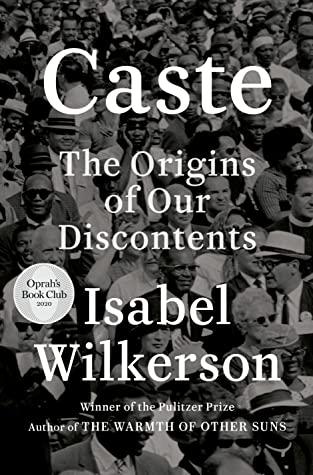This summer I read two powerful books about race that I’d encourage everyone to read, particularly those interested in U.S. history and racial issues. This is a discussion of the first of those two books.
Caste: The Origins of Our Discontents, by Isabel Wilkerson, is a book you’ve probably already heard much about. I found it a comprehensive, moving, and very relevant book about the history of racism in the United States and what that means for our country today. Wilkerson explains the use of the term “caste” as it pertains to people in the U.S. who are black as well as other minority groups. She compares the treatment of black people in the U.S. to the caste system in India, where people are born into a status group at birth and their assignment to that group impacts how they are treated, what they can do for a living, where they can live and who they can marry, among other things.
Slavery was not merely an unfortunate thing that happened to black people. It was an American innovation, an American institution created by and for the benefit of the elites of the dominant caste and enforced by poorer members of the dominant caste who tied their lot to the caste system rather than to their consciences.
Caste by Isabel Wilkerson
She also compares the treatment of Jews by the Nazis to the treatment of blacks in the U.S. As a Jew, I don’t take comparisons to Nazis lightly – but in this book she not only establishes well-documented parallels (such as laws pertaining to interracial relationships and marriage) but also establishes that the Nazis looked to U.S. racial policies to establish their own laws to degrade and de-humanize the Jews. I was shocked to discover this.
Caste is one of those books where, even if you feel you know a lot about the history of racial discrimination, you’ll find there’s so much you don’t know. Her “pillars” of caste systems include divine will/natural order, heritability, stigmatization, dehumanization, pollution versus purity, and rules about love and marriage. She explains our history in ways that are understandable but also extremely disturbing. She doesn’t shy away from describing slavery as legally-promoted torture, and explains the many ways that whites, as the dominant caste, sought to depict slavery as kinder and less harmful than it actually was. She also explains the impacts of, and the motivations behind, the post-Civil War labor camps, lynching, segregation and miscegenation laws. She explains the Trump voter in a way I found particularly relevant, and I was also disturbed by her discussion of the health impacts of racism.
Caste breaks down racism into a series of systemic approaches to keeping the lowest caste down, which incentivizes other groups to maintain their status at the expense of the lowest group — therefore, doing the dirty work that the highest caste doesn’t have to do. A perfect example of this is the Trump voter. By voting for racism, these voters are seeking to maintain whatever small advantage they have, at the cost of those who are part of a lower caste.
Caste is insidious and therefore powerful because it is not hatred, it is not necessarily personal. It is the worn grooves of comforting routines and unthinking expectations, patterns of a social order that have been in place for so long that it looks like the natural order of things.
Caste by Isabel Wilkerson
Also compelling was the way Wilkerson included her own experiences as a black female journalist. She writes about a time in an airport when, while hurrying to pick up a rental car to get to an interview, she is detained by two airport police who give no reason they’ve stopped her. Then they accompany her on the van to the rental car company, checking her identification and her credentials in front of everyone, until finally allowing her to go on her way. She writes about a time that she was physically assaulted by a white man in front of other people and yet no one around her said or did anything to help.
For a “lighter” but still very disturbing exploration of personal experiences with racism, I also recommend You’ll Never Believe What Happened to Lacey by Amber Ruffin and Lacey Lamarr.
I listened to the audiobook, narrated by Robin Miles, though I occasionally went to the print version as well, since there is so much detail covered in this book. This is a difficult book to read at times but I highly recommend it, particularly to readers in the U.S.
In a separate post I’ll discuss a related book, Devil in the Grove by Gilbert King, which is about the trial of four black men in Groveland, Florida, and the civil rights work of Thurgood Marshall and the NAACP in the 1940’s and 50’s.
If you’ve read Caste, please share your thoughts – and please share other recommended reading on this subject.


